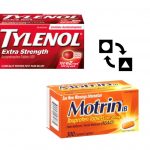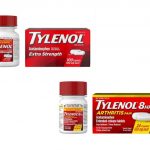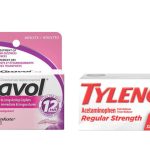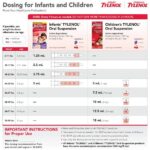How To Alternate Tylenol And Motrin
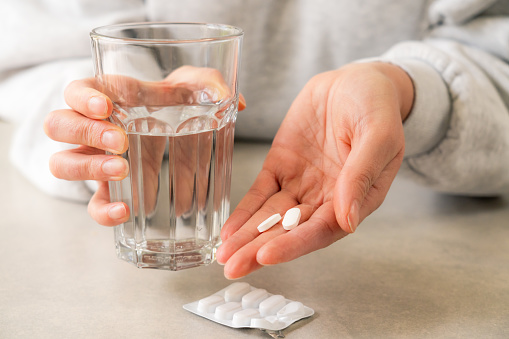
Studies have shown that alternating between Tylenol (acetaminophen) and Motrin (ibuprofen) can be an effective way to manage pain and reduce fever, particularly in children. However, it is important to follow the correct dosing instructions to avoid potential side effects and ensure maximum effectiveness.
In this article, we will provide a detailed guide on how to alternate Tylenol and Motrin, including dosing recommendations, safety precautions, and tips for effective pain and fever management.
Understanding Tylenol and Motrin
Before discussing how to alternate Tylenol and Motrin, it is important to understand how these medications work and how they differ from each other.
Tylenol (acetaminophen) is a pain reliever and fever reducer that works by blocking the production of prostaglandins, which are chemicals in the body that cause inflammation and pain. Tylenol is available in various forms, including tablets, capsules, liquid, and suppositories, and is often used to treat headaches, muscle aches, toothaches, menstrual cramps, and fever.
Motrin (ibuprofen) is also a pain reliever and fever reducer, but it works differently than Tylenol. Motrin belongs to a class of medications called nonsteroidal anti-inflammatory drugs (NSAIDs), which work by blocking the production of prostaglandins and other chemicals that cause pain and inflammation. Motrin is available in various forms, including tablets, capsules, liquid, and topical cream, and is often used to treat pain and inflammation associated with arthritis, menstrual cramps, dental pain, and fever.
While both Tylenol and Motrin can be used to manage pain and reduce fever, they have different dosing recommendations and safety profiles. It is important to follow the correct dosing instructions for each medication to avoid potential side effects and ensure maximum effectiveness.
Dosage Recommendations for Tylenol and Motrin
The recommended dosage for Tylenol and Motrin depends on the age, weight, and medical condition of the person taking the medication. It is important to use the correct dosage and not exceed the maximum daily dose to avoid potential liver damage (with Tylenol) or stomach bleeding (with Motrin).
Here are the recommended dosages for Tylenol and Motrin based on age and weight:
Tylenol Dosage:
• Infants under 6 months: Ask a doctor
• Infants 6-23 months: 160 mg (5 ml) every 4-6 hours, up to a maximum of 4 doses in 24 hours
• Children 2-3 years: 160-240 mg (5-7.5 ml) every 4-6 hours, up to a maximum of 5 doses in 24 hours
• Children 4-5 years: 240-320 mg (7.5-10 ml) every 4-6 hours, up to a maximum of 5 doses in 24 hours
• Children 6-11 years: 320-480 mg (10-15 ml) every 4-6 hours, up to a maximum of 5 doses in 24 hours
• Adults and children 12 years and older: 325-650 mg every 4-6 hours, up to a maximum of 4 doses in 24 hours
Motrin Dosage:
• Infants under 6 months: Ask a doctor
• Infants 6-11 months: 50 mg (1.25 ml) every 6-8 hours, up to a maximum of 4 doses in 24 hours
• Children 12-23 months: 50-100 mg (1.25-2.5 ml) every 6-8 hours, up to a maximum of 4 doses in 24 hours
• Children 2-3 years: 100 mg (2.5 ml) every 6-8 hours, up to a maximum of 4 doses in 24 hours
• Children 4-5 years: 120-150 mg (3-3.75 ml) every 6-8 hours, up to a maximum of 4 doses in 24 hours
• Children 6-11 years: 200-400 mg (5-10 ml) every 6-8 hours, up to a maximum of 4 doses in 24 hours
• Adults and children 12 years and older: 200-400 mg every 4-6 hours, up to a maximum of 6 doses in 24 hours
It is important to note that the maximum daily dose of Tylenol for adults and children over 12 years old is 4,000 mg (or 12 tablets), while the maximum daily dose of Motrin for adults is 1,200 mg (or 6 tablets) and for children is based on weight. Exceeding these maximum doses can increase the risk of liver damage (with Tylenol) or stomach bleeding (with Motrin).
How to Alternate Tylenol and Motrin
When alternating between Tylenol and Motrin, it is important to follow a specific schedule to ensure that the medications do not overlap and to avoid potential side effects. The general rule is to alternate between the two medications every 3-4 hours, but the exact schedule depends on the dosing recommendations for each medication and the age and weight of the person taking them.
Here is a sample schedule for alternating between Tylenol and Motrin:
• 0-3 hours: Tylenol (followed by Motrin if needed)
• 3-6 hours: Motrin (followed by Tylenol if needed)
• 6-9 hours: Tylenol (followed by Motrin if needed)
• 9-12 hours: Motrin (followed by Tylenol if needed)
Note that the above schedule is for illustrative purposes only and should be adjusted based on the dosing recommendations for each medication and the age and weight of the person taking them. It is also important to not exceed the maximum daily dose of each medication when alternating between them.
Safety Precautions when Alternating Tylenol and Motrin
While alternating between Tylenol and Motrin can be an effective way to manage pain and reduce fever, it is important to follow safety precautions to avoid potential side effects and ensure maximum effectiveness.
Here are some safety precautions to keep in mind when alternating between Tylenol and Motrin:
• Use the correct dosage: Follow the dosing recommendations for each medication based on the age, weight, and medical condition of the person taking them. Do not exceed the maximum daily dose of each medication.
• Do not use in combination with other medications: Do not use Tylenol or Motrin in combination with other medications that contain acetaminophen or ibuprofen, as this can increase the risk of liver damage (with Tylenol) or stomach bleeding (with Motrin).
• Monitor for side effects: Watch for signs of potential side effects, such as nausea, vomiting, stomach pain, rash, or difficulty breathing. If any of these occur, stop using the medication and seek medical attention.
• Consult a doctor if in doubt: If you are unsure about the dosing recommendations or safety of alternating Tylenol and Motrin, consult a doctor or pharmacist for guidance.
Tips for Effective Pain and Fever Management
In addition to alternating between Tylenol and Motrin, there are other tips for managing pain and reducing fever effectively.
Here are some tips for effective pain and fever management:
• Rest: Resting can help the body heal and reduce stress on the affected area.
• Drink plenty of fluids: Drinking plenty of fluids can help prevent dehydration and flush out toxins.
• Apply cold or heat: Applying a cold compress or a warm towel to the affected area can help reduce inflammation and relieve pain.
• Take a warm bath: A warm bath can help relax the muscles and relieve pain.
• Use natural remedies: Some natural remedies, such as ginger, turmeric, and chamomile, have anti-inflammatory and pain-relieving properties.
• Seek medical attention if necessary: If the pain or fever is severe or does not improve with over-the-counter medications and home remedies, seek medical attention.
It is important to note that pain and fever are often symptoms of an underlying condition, such as an infection or inflammation. Therefore, it is important to address the underlying condition in addition to managing the symptoms.
Conclusion
In summary, alternating between Tylenol and Motrin can be an effective way to manage pain and reduce fever. However, it is important to follow the dosing recommendations for each medication, not exceed the maximum daily dose, and monitor for potential side effects. It is also important to address the underlying condition causing the pain or fever and to use other tips for effective pain and fever management, such as resting, drinking plenty of fluids, and using natural remedies. If you have any doubts or questions about alternating between Tylenol and Motrin, consult a doctor or pharmacist for guidance.

